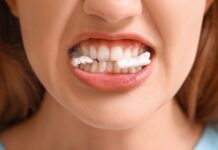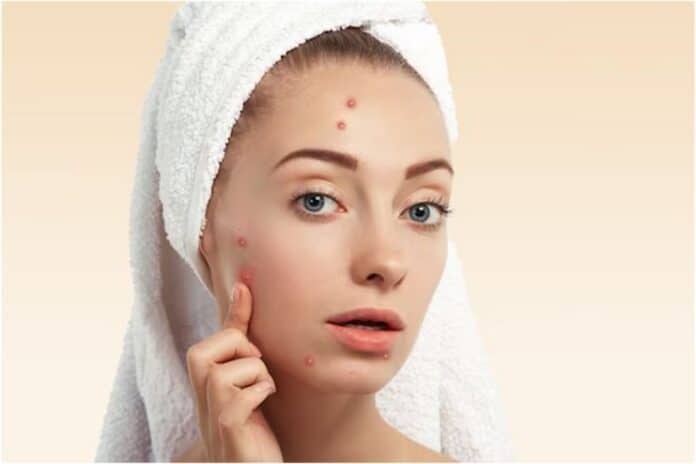Affiliate Disclaimer
Some links in this article are affiliate links. We may earn a small commission if you make a purchase through these links, at no extra cost to you. We only recommend products we find useful to our readersAcne can be painful, uncomfortable, and annoying. You must be doing everything in your capacity to avoid skincare mistakes, but you are still fighting the problem of acne. You are not alone. According to the Mayo Clinic, acne affects approximately 50 million people every year and is a common skin issue in the United States.
Acne is a skin condition caused when hair follicles become clogged with oil and dead skin cells. It can cause whiteheads, blackheads, or pimples. Although it is most common among teenagers, it affects people of all ages.
Surprisingly, the most popular skincare routines sometimes worsen your acne. This can be due to various factors, including over-cleansing, skipping sunscreen, or other minor mistakes that fail your efforts. Also, taking excessive stress can be another factor for acne flare-ups. Here’s a guide to understanding the effects of stress on skin condition.
This article will teach us about skincare mistakes that trigger acne and best practices for acne-prone skin.
Habits Beyond Skincare That Can Worsen Acne
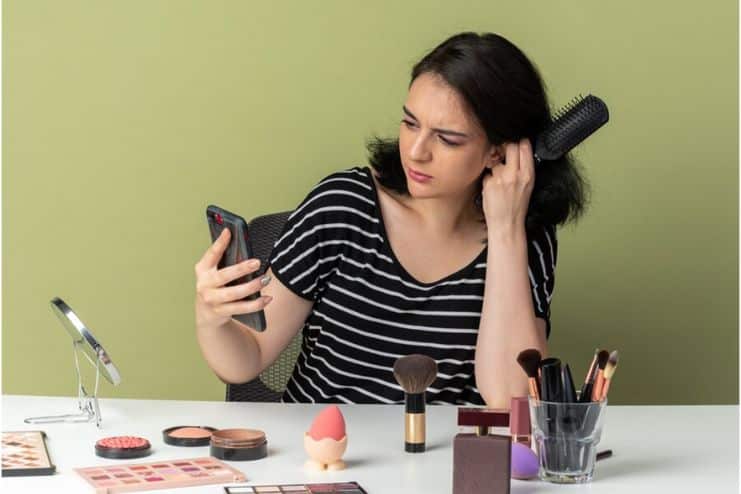
A few common habits might seem normal, but they have an adverse impact on the skin, especially acne-prone skin.
- Touching Your Face Frequently:
You might touch your face often, and this seems harmless. However, with every touch, you transfer bacteria, dirt, and oils from your hands to your skin. These impurities clog pores and cause breakouts. For example, resting your chin on your hands or touching blemishes further worsens the inflammation. Here’s an insightful article on ways to get rid of blemishes naturally! - Using Dirty Tools and Accessories:
Using clean accessories is crucial. You must clean makeup brushes, pillowcases, and phone screens used every day. These collect bacteria, oils, and dead skin cells. Using these unclean items repeatedly makes your skin even more acne-prone. Clean pillows once a week, rub phone screens daily, and clean makeup brushes after a few uses. - Popping Pimples:
Popping pimples damages the outer layer of the skin, temporarily relieving irritation by pushing germs inside the pore. However, this increases the likelihood of infection and allows for the formation of scarring and black spots. Try a spot treatment, available with either salicylic acid or benzoyl peroxide, that decreases inflammation and the duration of the wound.
Common Skincare Mistakes That Trigger Acne
- Overwashing the Face:
Washing your face can be a good skincare habit. However, washing or overwashing it often strips your skin of natural oils. This leads to overproduction of sebum, which is a key acne trigger. You must cleanse your face daily with a gentle, non-comedogenic cleanser. - Skipping Moisturizer:
Avoiding moisturizers if you have oily skin is the biggest mistake. Moisturizers do not clog pores; they hydrate your skin. Skipping hydration can lead to dryness, causing your skin to produce even more oil. Choose lightweight, oil-free moisturizers specially formulated for acne-prone skin. - Using the Wrong Products:
Use products that suit your skin. Avoid products with comedogenic ingredients or harsh exfoliants. These can irritate acne-prone skin. According to CureSkin, you must check labels for terms like “non-comedogenic” and avoid pore-clogging ingredients such as coconut oil and lanolin. - Not Removing Makeup Before Bed:
As much as you focus on looking the best and using good makeup products, it is even more crucial to remove your makeup before bed. If you do not do this, it might lead to clogged pores and breakouts. Make sure to use a gentle makeup remover or micellar water before cleansing. - Overusing Acne Treatments:
Over-applying salicylic acid or benzoyl peroxide can dry out and irritate the skin, worsening acne. Follow product instructions and focus on targeted applications.
How to Build an Acne-Friendly Skincare Routine
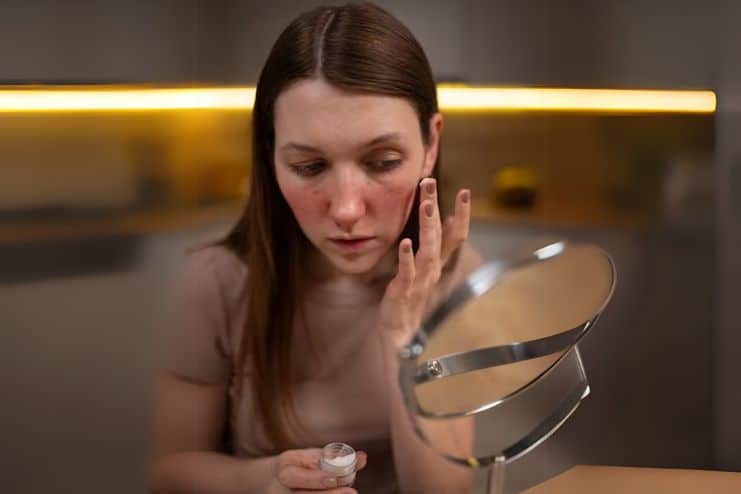
Acne-prone skin needs special care. Certain acne triggers must be avoided to achieve healthy, perfect skin. Creating a skincare routine tailored to acne-prone skin is essential for managing breakouts.
Here are a few best practices for acne-prone skin:
- Cleanse Gently:
Acne-prone skin needs a sulfate-free cleanser designed specifically for it. Opt for cleansers with salicylic acid to help unclog pores. This leads to less oily skin and prevents excessive dryness. Avoid harsh scrubbing, as it can irritate the skin and worsen acne. - Hydrate Wisely:
As mentioned earlier, you cannot skip moisturizer altogether. Even oily or acne-prone skin needs hydration. Use a lightweight, non-comedogenic moisturizer that ensures your skin stays hydrated without clogging pores. Use formulations with soothing ingredients like hyaluronic acid or ceramides to repair the skin’s barrier. - Spot Treatments:
Applying targeted treatments directly to active breakouts helps acne-prone skin. These treatments contain ingredients like benzoyl peroxide, which helps kill acne-causing bacteria. Salicylic acid exfoliates inside the pores to prevent clogs. Use it wisely to prevent overdrying the surrounding skin. - Apply Sunscreen Daily:
Your skin is sensitive to sunlight, so you must protect it from UV rays. This is essential when using acne treatments, as they make your skin more sensitive to sunlight. Choosing an oil-free, non-comedogenic sunscreen with SPF 30 or higher is the key here. Regular use of sunscreen prevents dark spots and hyperpigmentation post-acne. - Incorporate Beneficial Ingredients:
- Niacinamide: Niacinamide helps reduce inflammation and promotes healthy skin.
- Tea Tree Oil: Tea tree oil has numerous skin benefits, including natural antibacterial properties that combat breakouts.
- Azelaic Acid: Acne and post-acne marks can be an issue. Azelaic acid helps fade post-acne marks, reduces redness, and prevents breakouts. Read this article to learn ways to get rid of acne scars naturally.
Introduce new products slowly to ensure your skin tolerates them well. Read this if you are looking for skin care tips that will keep your skin year-round.
Lifestyle Tips to Support Clear Skin

Following best practices for acne-prone skin helps maintain healthy skin. However, having a few healthy lifestyle habits can go a long way. Here are a few lifestyle tips to avoid acne triggers in skincare.
- Eat a Balanced Diet:
Limiting sugar, dairy, and processed foods can keep acne and breakouts at bay. - Manage Stress:
Stress can trigger acne and breakouts. Include stress-relief techniques such as yoga or meditation to reduce acne flare-ups. - Stay Consistent:
Skincare improvements take time. Stick to your routine and be patient.
When to Consult a Dermatologist
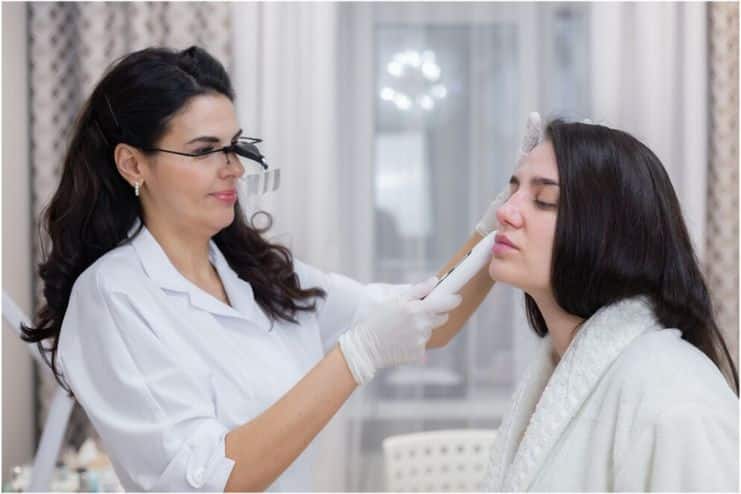
If you are following an acne-prone skincare routine and still face acne issues. This is the right time to consult a dermatologist. These are specialists who help you manage severe, painful breakouts. With their help, you can opt for advanced treatments, including chemical peels or any other prescribed medications.
If your acne persists despite following an optimized routine or if you experience severe, painful breakouts, consult a dermatologist. They can recommend advanced treatments such as chemical peels, prescription medications, or other professional interventions.
If you want to learn a dermatologist’s recommended skincare routine, this article is perfect.
Conclusion:
Clearer, healthier skin is about what you do and what you put on it. Avoiding overwashing, picking the right ingredients for your skin, keeping your tools clean, and managing stress all contribute to the larger goal of effective acne management. Remember that patience is the key: consistent effort and a well-crafted routine take time to bear fruit.
Avoiding common mistakes will help you develop the best routine for your unique skin. If you’re getting constant breakouts, severe ones, or whatnot, don’t be shy about going to see a dermatologist. They can then recommend prescription treatments or procedures as necessary. Educate yourself and begin the journey to refining your habits. Your skin will appreciate you.
Your journey to acne-free, radiant skin begins today! Great skin is worth the effort!
References
- https://in.sugarcosmetics.com/blog/skincare-mistakes-that-will-make-your-acne-worse
- https://cureskin.com/mistakes-people-make-during-acne-treatment/
- https://www.nytimes.com/2018/10/09/style/wash-that-face.html
- https://www.cerave.com/skin-smarts/skincare-tips-advice/how-to-choose-a-moisturizer-for-oily-skin
- https://www.webmd.com/skin-problems-and-treatments/features/pop-a-zit
In this Article













